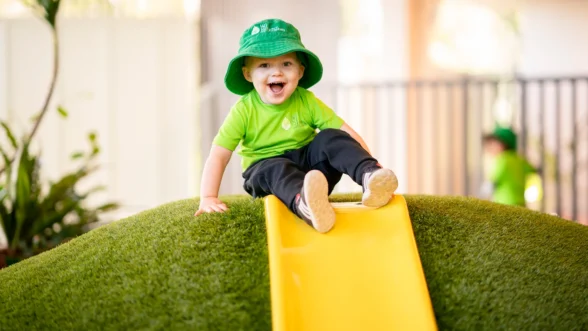Speech is an important part of your child’s developmental journey. But, as with any milestone, the age and stage at which children start talking varies greatly. While a speech delay doesn’t always mean something is wrong, there are steps you can take to support your child if they do struggle. To learn more, read on.
What is a speech delay?
Generally speaking, according to the American Family Physician, a child is considered to have a speech delay if their speech development is significantly below the norm for their age and is more typical of a child of a younger age.
A child with a speech delay will acquire skills in a normal sequence (from cooing and babbling to imitating sounds without meaning, then sounds with meaning before increasing their vocabulary and comprehension) but at a slower-than-normal rate.
Delayed speech may be a sign of something more serious, like an underlying developmental or neurological disorder or a hearing impairment. Of course, this isn’t always the case – and, if it is, early detection and intervention can lead to positive outcomes. Your child could well be talking your ears off before you know it.
According to Healthline, some signs of speech delay could include:
- Age 2: Doesn’t use at least 25 words
- Age 2 1/2: Doesn’t use unique two-word phrases or noun-verb combinations
- Age 3: Doesn’t use at least 200 words, doesn’t ask for things by name, hard to understand even if you live with them
- Any age: Unable to say previously learned words
It is important to note the difference between speech delay and other seemingly similar conditions. For example, where a speech delay relates to the verbal expression of language and articulation, a language delay impacts how children give and receive information. A child with a language delay might say words well, but only be able to put two words together.
A speech disorder – like an articulation or phonological disorder – is another condition that should not be confused with a speech delay. Speech disorders can include stuttering and apraxia (caused by issues with lip, jaw and tongue movements) and make a child’s speech difficult to understand.
Similarly, developmental language disorders (DLD) are diagnosed in people who have difficulty talking and/or understanding language. Children with DLD may struggle organising sentences and telling stories, remembering what someone has said and reading and writing.
Causes of speech delay
So, what can cause speech delay? According to experts, it could be due to one of the following conditions:
- An oral impairment: A problem with the tongue or palate
- A short frenulum: The fold beneath the tongue can limit movement if too short, making it hard to create sounds like ‘D’, ‘L’, ‘R’, ‘S’, ‘T’, Z’ and ‘th’
- An oral-motor problem: An issue with the area of the brain that is responsible for speech (this makes it hard to coordinate the lips, teeth and tongue and could also cause feeding problems)
- Hearing loss: Not hearing well, or hearing distorted speech
- Lack of stimulation: Environmental factors like lack of engagement can prevent children from picking up on speech
- Autism spectrum disorder: Could be combined with echolalia (repeating phrases), repetitive behaviours, impaired social interaction and speech and language regression
- An intellectual disability: A cognitive issue rather than an inability to form words
Children who deprived of psychosocial interaction (i.e., who don’t spend enough time talking with adults) may develop speech delay, as might children who live in a bilingual home.
Interestingly, being an twin could lead to speech delay – a study of 473 sets of twins found that, compared with single-born children, the rates of late language emergence were twice as high in twins.
When to get help for speech delay
Remember that children develop at different rates, so while your child may not speak at the same level as their peers, it isn’t necessarily cause for concern.
Between 10 and 20 percent of two-year-olds are late to develop language, with boys three times more likely than girls.
You can use the following guidelines to determine how your child is tracking for their age. If you are concerned, reach out to your child’s doctor to discuss your options.
- 1 to 6 months: Coos in response to voice
- 6 to 9 months: Babbling
- 10 to 11 months: Imitation of sounds; says “mama/dada” without meaning
- 12 months: Says “mama/dada” with meaning; often imitates two- and three-syllable words
- 13 to 15 months: Vocabulary of four to seven words in addition to jargon; < 20% of speech understood by strangers
- 16 to 18 months: Vocabulary of 10 words; some echolalia and extensive jargon; 20% to 25% of speech understood by strangers
- 19 to 21 months: Vocabulary of 20 words; 50% of speech understood by strangers
- 22 to 24 months: Vocabulary > 50 words; two-word phrases; dropping out of jargon; 60% to 70% of speech understood by strangers
- 2 to 2 ½ years: Vocabulary of 400 words, including names; two- to three-word phrases; use of pronouns; diminishing echolalia; 75% of speech understood by strangers
- 2½ to 3 years: Use of plurals and past tense; knows age and sex; counts three objects correctly; three to five words per sentence; 80% to 90% of speech understood by strangers
- 3 to 4 years: Three to six words per sentence; asks questions, converses, relates experiences, tells stories; almost all speech understood by strangers
- 4 to 5 years: Six to eight words per sentence; names four colours; counts 10 pennies correctly.
Treating a speech delay
There are a number of options available when it comes to speech delay treatment but of course, these will differ depending on the cause of the problem. Some options for treatment include:
- Speech-language therapy: Applied by speech therapists, this is the most common treatment for children with speech and language disorders
- Early intervention services: An effective way to reduce long-term impacts, this therapy focuses on the paediatric brain (the first three years of like)
- Treating the underlying conditions: It makes sense that if you treat the underlying cause of your child’s speech delay, you will in turn treat the speech delay, too. This could lead to treatments like applied behaviour analysis (ABA) therapy or occupational therapy.
What can parents do?
Knowing that children need psychosocial engagement to improve their speech, there are certain things you – as their parent – can do to help prevent or overcome speech delays. These include:
- Taking directly to your toddler, even just narrating what you’re doing, and making sure you’re giving them your full attention when talking to them
- Repeating their words correctly (don’t criticise the errors)
- Ask questions and give choices, while giving them plenty of time to respond
- Give them a chance to articulate their needs themselves, even if you know what they want
- Singing and reading with them from an early age
What is separation anxiety in children? Learn more

